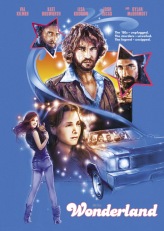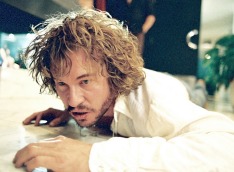|
Wonderland
|
| |
 |
USA, 2003. Rated R. 108 minutes.
Cast:
Val Kilmer, Lisa Kudrow, Kate Bosworth, Dylan McDermott, Josh Lucas, Tim
Blake Nelson, Eric Bogosian, Ted Levine, Christina Applegate, Natasha
Gregson Wagner, Janeane Garofalo, Faizon Love, Carrie Fisher
Writers: James Cox & Captain Mauzner; Todd Samovitz & D. Loriston
Scott
Original Music: Cliff Martinez
Cinematography: Michael Grady
Producers: Holly Wiersma, Michael Paseornek
Director: James Cox
LINKS
|
 .A.
Noir, or the dark side of Los Angeles lore, is a fascinating component of
the city's character. Being the "film capital of the world," it is not surprising
that many of L.A.'s most infamous, grizzly crimes have involved actors, directors,
rock stars, club owners, or friends of the above. The Black Dahlia case concerned
the death of Elizabeth Short, an aspiring actress turned escort. When Lana Turner's
daughter stabbed her mother's boyfriend Johnny Stompanato, it precipitated what
the media portrayed as a greater tragedy—the murder of Turner's career.
The Tate-LoBianco murders sadly fascinated the American consciousness; due to
a potent amalgam of cult, money, and celebrity.
.A.
Noir, or the dark side of Los Angeles lore, is a fascinating component of
the city's character. Being the "film capital of the world," it is not surprising
that many of L.A.'s most infamous, grizzly crimes have involved actors, directors,
rock stars, club owners, or friends of the above. The Black Dahlia case concerned
the death of Elizabeth Short, an aspiring actress turned escort. When Lana Turner's
daughter stabbed her mother's boyfriend Johnny Stompanato, it precipitated what
the media portrayed as a greater tragedy—the murder of Turner's career.
The Tate-LoBianco murders sadly fascinated the American consciousness; due to
a potent amalgam of cult, money, and celebrity.
The facts of the Wonderland case are these:
- The 1981 "Four on the Floor" murders on Laurel Canyon's Wonderland Avenue
left Ron Launius, Joy Miller, Barbara Richardson, and Billy Deverell (all
members of a drug gang) bludgeoned to death.
- To this day, the case remains technically unsolved, although drug
baron, Adel Nasrallah (a.k.a. Eddie Nash) pled guilty to conspiracy to commit
the killings.
- At the center of it all was John Holmes—an ex-porn star known to his
fans as "Johnny Wadd" by virtue of his 14-inch endowment, and who was rumored
to have had sex with 14,000 women in over 2,000 adult films.
Wonderland opens with explicit disclaimers. It is clearly expressed
that what we are about to see is not Holmes in his prime (in other words,
this is NOT Boogie Nights, and we will NOT see Val Kilmer's penis, real
or synthetic). In 1981, Holmes's film career was all but over. He hung out with
drug dealers to fuel a ferocious cocaine habit. He was in Tailspinville.
This is how we find him. Although still married to his wife Sharon (Lisa Kudrow),
John Holmes (Kilmer) is living in L.A. motels with his teenaged girlfriend,
Dawn (Kate Bosworth). Holmes is prone to leaving little Dawn alone for hours
at a time. He returns from one of these jags extremely distraught. Shortly afterward,
he is brought into police custody under suspicion of the Wonderland murders.
The ammo the cops have on Holmes is based on the testimony of David Lind (Dylan
McDermott), a surviving member of the Wonderland gang, who claimed to be "on
a business errand" that night. According to Lind, Holmes was ultimately responsible,
even if he did not swing the pipe.

John Holmes (Val Kilmer) hits rock bottom in Wonderland.
|
It is through the conflicting recollections of Lind and Holmes that we see
the actual members of the gang and are challenged to construct "the truth" for
ourselves. This Rashomon-style narrative has become a popular story-telling
technique, used most recently in The Usual Suspects and Basic.
Director James Cox's pieces of the elusive Wonderland truth however are
not simply "presented" to the audience ambiguously (which is really the point
of this device). Rather, they are fed to us in visually charged, frenetic sequences,
reminiscent of music videos. There are rolling collages of images set to music,
superimposed letters and numbers, and split screens. Although entertaining,
this kinetic frenzy reads more like a stylistic exercise for Cox. What, the
complex story structure, the graphic murder, the drugs, and the porn weren't
enough to hold our attention? A little trust in the audience might be nice.
This fast-paced style effectively enhances the film's intro sequence (which
features Bad Company's "Shooting Star" playing at full blast…cutting to whizzing
credits…framing the lead character as a Superhero). Done in this context, (like
the campiness of the Wonderland poster) it addresses the novelty, the
baggage, and the mythology that Holmes/"The Wadd" carries with him. It playfully
breaks the ice. But if we are headed for a serious look into this crime and
the characters within it (which is what Cox seems to be aiming for), we should
be presented with some kind of sign on this already rough road, rather than
more, "look at what I can do with our editing software" aesthetics.
When the music volume and rapid cutting subside, Wonderland reveals
some resonant performances. Because of Kilmer's ability to disappear into biographical
characters (e.g., The Doors and Tombstone), we see Holmes in states
of vulnerability, rage, fear, weakness, arrogance, and gluttony. It begins not
to matter that Kilmer looks nothing like the actual John Holmes. After a while,
he even ceases to look like Jim Morrison! One could argue that Wonderland
was written as a blatant acting exercise for Kilmer, who likes (pardon the pun)
"meaty" character studies. What better way to see a good and evil Val, a cowardly
Val, a loving Val, and a sick Val than to write "different perspectives" into
the script? This argument needs to be addressed with an emphatic, "Who the hell
cares? His performance is worth it. Period."
Lisa Kudrow is also remarkable as Sharon Holmes, who (let's face it) is a tough
role to fill. Imagine the treatment…"Here is a woman who lost her husband and
his "gift" to the adult film industry/an underaged neighbor, but who stays married
to him out of loyalty and friendship…AND plays pseudo mom and sister to the
wayward couple…" As she did in The Opposite
of Sex, Kudrow abandons her Phoebe-like affectations and we get to see
a stark, yet complex Sharon Holmes. In fact, the most moving scenes involve
the odd familial dynamic between John, Sharon, and Dawn (who is aptly portrayed
by Kate Bosworth, who has officially redeemed herself for Blue
Crush). Their love for each other—albeit dysfunctional—seems
to be the only constant among the flashbacks and double takes. On the whole,
if Wonderland's acting is any indication, Cox proves to be a versatile
and effective director.
Perhaps the key to selling L.A. Noir cinematically is to communicate to your
audience that nothing should be accepted as TRUTH (well, that, and a grainy
filter). Cox and Wonderland attempt to pull this off, even if they do
it at high volume, every chance they get. Amid all this ambiguity business,
however, one thing is crystal clear: When the youngest student ever admitted
to the Drama department at Julliard (Kilmer) plays a derailed porn god…YOU SEE
IT.
Review
© October 2003 by AboutFilm.Com and the author.
Images © 2003 Lions Gate Entertainment. All Rights Reserved.


